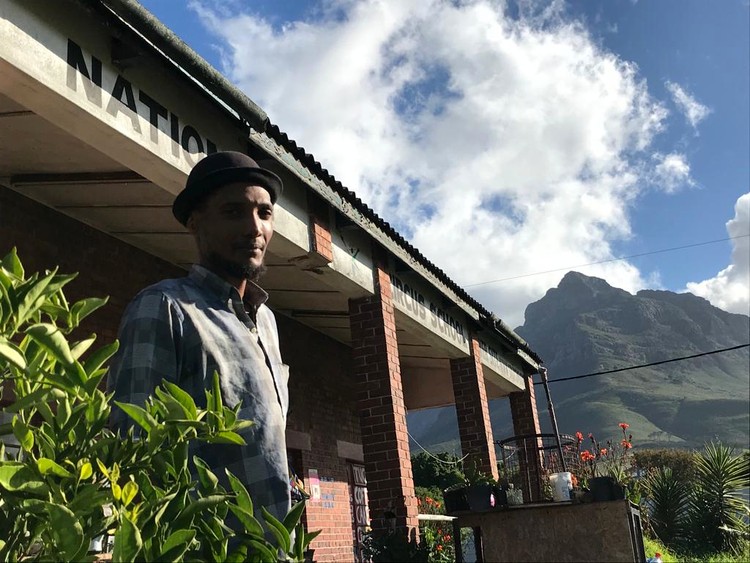
14 April 2023
Graham Petersen outside the former circus school in Observatory, where 29 people occupy land owned by the City of Cape Town. Petersen says he’ll simply become homeless if they are evicted. Photo: Steve Kretzmann
The City of Cape Town has offered to relocate a group of people living on property formerly leased to the South African National Circus School in Observatory to sites in Philippi, Mfuleni or its Culemborg Safe Space shelter at the Foreshore.
This was revealed in the City’s court application for an eviction order against the group of 29 occupants at the Cape Town regional court on Thursday. But the group, who call themselves the Willow Arts Collective (WAC), rejected these offers.
Some of them initially moved onto the premises in 2016 when the circus founder unlawfully sublet the property, which is owned by the City. The circus’s lease was terminated in 2017.
GroundUp reported that the residents have since started growing vegetables to feed themselves and surrounding soup kitchens and create art on the property.
The City initially approached the court for an eviction order in September 2019. Before the order could be granted, the City had to compile a report on the occupants’ personal circumstances and engage with them to find alternatives to eviction.
In July 2021, the group lost a bid to have some details of the City’s housing report excluded from the court record. The housing report was completed in June 2020, but the court gave the occupants about a week after the July 2021 hearing to respond to the report.
This week, the City has also offered to provide housing kits to members of the Willow Arts Collective if private landowners give them permission to erect structures on their land. So far no private landowners have volunteered to house them despite calls on social media and earlier support from civic groups and residents of Observatory.
The City, represented by advocate Bronwyn Wharton, argued that the property, which was to be used as an extension of the Hartleyvale sporting complex for public use, had been “hijacked” by the WAC.
Responding to the group’s rejection of the proposed alternative accommodation offers, Wharton said that the City was not obligated to provide accommodation at a specific location. The occupiers could not determine where they should be moved.
One of the group’s arguments against being relocated to Kampies in Philippi or Bosasa in Mfuleni, was the distance these areas are from Observatory – where they made a living.
In response to this, Wharton told the court that most of the occupants had declined to provide their personal details in questionnaires which formed part of the City’s housing report. This meant there was no way of determining how dependent the occupants were on being in, or close to, Observatory.
She argued that the Culemborg Safe Space is an acceptable alternative because it is relatively close to Observatory and was suitable as there is only one couple among the occupants.
She argued the occupiers could not be deemed a collective as 16 of the original members had since left, with new people moving onto the land to take their place.
The court, she said, was not required to specify what temporary accommodation must be made available, only to direct the City to provide it. The occupiers’ preference as to where they want to live was no basis for the court to refuse an eviction order, she said.
Advocate Jonty Cogger from Ndifuna Ukwazi Law Centre is representing the Willow Arts Collective. He challenges the City’s basis for bringing the eviction application, which he said was due to complaints by a handful of residents making sweeping statements about litter and crime.
Cogger argued that the occupants were supported by a much larger cohort of Observatory residents through community organisations.
In response to the City’s assertion that the land would be used for sporting purposes, Cogger argued that there already existed a plethora of sport and recreation facilities in the area.
He said when members of the WAC visited the site in Philippi, residents there warned them that it was dangerous, and that they were “constantly being attacked and robbed by other residents and police don’t come to help”. He added that one of the few employed occupants would have to spend his entire salary to commute to and from work. Those who were unemployed had little chance of finding employment in Philippi, he said.
Cogger said that Bosasa in Mfuleni was even further from Observatory and had a very real threat of xenophobic violence should the occupiers, many of whom are foreign nationals, be moved there.
He said during the site visit there, they had to flee the area after some members who split off to buy refreshments at a spaza shop were threatened.
Cogger said the Culemborg Safe Space was also unacceptable because it would not be a permanent solution as they would need to vacate during the day with their belongings and would only be allowed to stay there for up to six months.
He asked that if the court found it just and equitable to issue an eviction order, that it suspend the execution of the order until the City can provide suitable alternative accommodation close to Observatory.
Judgment was reserved.
Outside court, WAC member Glynnis Bentham, who works for Sex Workers Education and Advocacy Taskforce, said she would become homeless if evicted.
Bentham said she could not afford to travel from Mfuleni or Philippi to her work, and would rather be on the street than at the Culemborg Safe Space. She earns R9,000 a month and helps to support ten grandchildren.